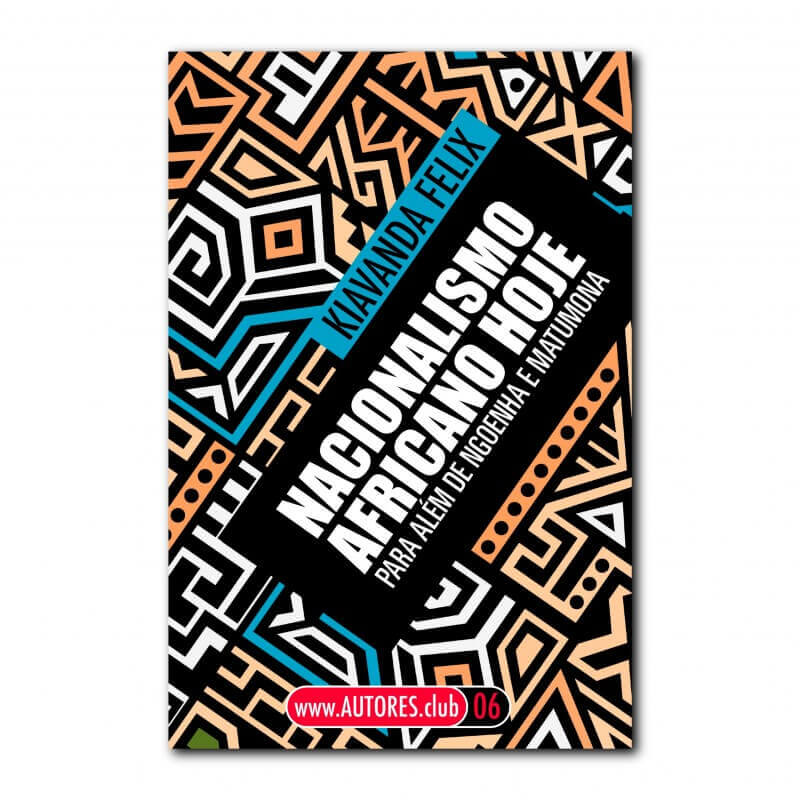- Temporarily Out of Stock













Author:Kiavanda Felix
Publisher: Alende - Edições | Perfil Criativo - Edições
Year of publication: September 2020
Angola Edition - ISBN: 978-989-54797-1-9
Portugal Edition - ISBN: 978-989-54702-7-3
The issue of "African Nationalism today" has been debated for almost a century among Africans. Its genesis lies in the anais es of the Pan-Africanist and Negritude movements. It was in the ideals and principles of these movements that the founders of the national liberation movements and the defenders of the values and ideals of Africans were inspired to carry out their emancipalist actions.
Language: Portuguese
________________________________________
BOOK FORMAT

 SECURITY
SECURITY
AUTORES.club uses security measures.
 DELIVERIES
DELIVERIES
Portugal: 4 days; Europe: 10 days; Rest of the world: 20 days.
 RETURNS
RETURNS
You can return your order within 14 days.
(+351) 214,001,788 | encomendas@autores.club
Order from a store near you.
Fnac | Worten | Wook | Bertrand | Promobooks
"The problem about "African Nationalism today" has been debated for almost a century among Africans. Its genesis lies in the anais es of the Pan-Africanist and Negritude movements. It was in the ideals and principles of these movements that the founders of the national liberation movements and the defenders of the values and ideals of Africans were inspired to carry out their emancipalist actions.
Names such as Léopold Sédar Senghor, Kwame Nkrumah, Julius Nyerere, Amílcar Cabral, Patrice Lumumba, Samora Machel, Agostinho Neto and others are prominent figures in this process. For through their pronouncements, their writings, their actions, their knowledge, they have cleverly led the continent to independence.
Almost half a century later, the problem of "African Nationalism" is again at the centre of debates among the academics of the new generation. Among them are Severino Elias Ngoenha ("From Independence to Freedoms", 1993; "Interculture, Alternative to Biopolitical Governance", 2013), Muanamosi Matumona ("The Reconstruction of Africa in the Age of Modernity", 2004), Ergimino Pedro Mucale ("Afro-centrality – Complexity and Freedom", 2013), Kwame Gyekye ("Tradition and Modernity", 1997), Maurice M. Makumba ("Introduction to African Philosophy - Past and Present", 2007), José Paulino Castiano ("References of African Philosophy – In Search of Intersubjectiveation", 2010) and others.
But what is meant by nationalism? We start from this question on a methodological question, because it will gradually lead us to those relevant or central issues of the subject in question.
In principle, nationalism is understood as the preference that a people has for their own values, symbols, uses and customs, to the detriment of those belonging to other peoples. They constitute their existential reference, from the moral, social and political point of view, that is, their worldview. And when they are called into question, the people, the nation bearer of such values, principles and symbols, does everything to ensure their preservation or their rescue. Many wars or conflicts, for example, which took place between societies, peoples, nations, took place in the name of their defense. World War II, carried out by Germany, took the name of exaltation and diffusion of Germanic values through Nazism. The actions dubbed terrorists, perpetrated by the Arabs against the West, such as the attack of 11 September 2001 in the USA, and, quite recently, the attack on the wording of the magazine "Charlie Hebdo" in December 2014 in Paris, in addition to other reasons, have as justification the defense of values and symbols (the figure of Muhammad, for example) of the Arab world. We do not want to justify Adolf Hitler's barbarism against Jews, Gypsies and homosexuals during World War II, nor the terrorist actions that have been carried out by some radical Arab groups in Europe, America and Africa. For we understand that no nationalist action and, in particular, nationalism to be implemented in Africa should be done by sowing terror or from the deprivation of what people have most sacred: life. These actions, in our view, do nothing to contribute to peace in the world or to the harmonization of relations between peoples, nations or states. (...)"
In Introduction
Introduction
CHAPTER I
CONCEPT OF NATIONALISM
1.1. Definition of the concepts Nation and People
1.2. Foundations of the Nation State in Ngoenha and Matumona
1.2.1. Foundations of the Nation State in Ngoenha
1.2.2. Foundations of the Nation-State in Matumona
1.3. Problems of the modern nation-state in Africa
1.4. Nationalism Concept
1.4.1. Problematic of Nationalism in the History of Political Philosophy
CHAPTER II
THE ORIGINS OF AFRICAN NATIONALISM
2.1. The Legacy of the Diaspora
2.1.1. Pan-African Congresses and their significance
2.1.2. Meaning of pan-African Congresses
2.2. The problem of the definition of space for the proclamation of African independence
2.3. Priorities of African States during and after the colonial period
CHAPTER III
MEANING OF NATIONALISM TODAY, ACCORDING TO NGOENHA AND MATUMONA
3.1. Reasons to continue to talk about nationalism in Africa according to Ngoenha
3.1.1. What Development?
3.1.2. What Governance for Africa?
3.1.3. The Question of the legitimacy of political power in Africa, according to Ngoenha
3.1.4. How this governance system should work
3.1.4.1. Advantages of federalism in the African context, according to Ngoenha
3.1.5. Cultural, social and political contract
3.1.5.1. Cultural Contract
3.1.5.2. Social Contract
3.1.5.3. Political contract
3.2. African Nationalism in Matumona
3.2.1. Modernity in Matumona
3.2.2. Characteristics of African Societies from a Traditional Point of View
3.2.3. The Fear of Modernity
3.2.4. What is the current status of African societies?
3.2.5. Consequences of Modernity in African societies
3.2.6. Why open yourself to modernity?
3.2.7. Obstacles to the consolidation of the emancipation (of freedom) of Africans, according to Matumona
3.3. Ngoenha and Matumona, convergences and divergences
3.3.1. Convergences between Ngoenha and Matumona, around the issue "African nationalism today"
3.3.2. Divergences between Ngoenha and Matumona, around the issue "African Nationalism today"
CHAPTER IV
AFRICAN NATIONALISM TODAY,
IN ADDITION TO NGOENHA AND MATUMONA
4.1. What do Africans want?
4.2. The national alliance
Conclusion
Bibliography
MAIN WORKS
SECONDARY WORKS